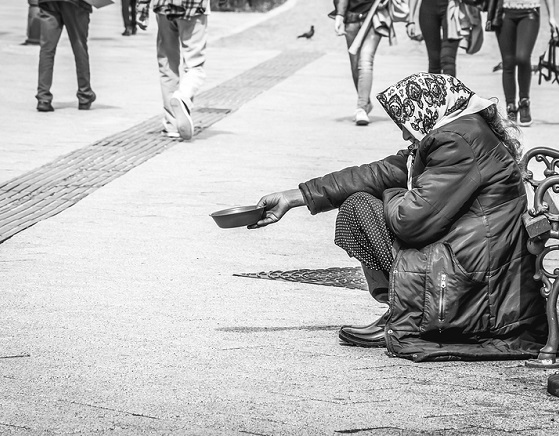Sister, Can You Spare the Time?

I’m troubled by the homeless. For them, really. I don’t imagine anyone intends to live their life on the street.
Someone suggests there are choices, and in any event, he’d rather not see them. It’s ugly. It’s disturbing. It’s in our face. But how do they feel? Are we not to have empathy for our fellow woman, who may have been broken by life’s hard knocks? Are we indifferent or afraid of her presence? She’s there, on the doorstep or by an abandoned storefront.
You can’t kick a gal when she’s down. Yet, how long is she meant to stay down? Is it her human right, a malady, or a huge societal dilemma? Are we enablers when we don’t address the homeless problem seemingly growing by leaps and bounds? Are we Mother Teresa, ministering to those less fortunate and accepting of all? They are us and we are them, after all.
Maybe not, you say, you cannot relate. Some of us are compassion junkies, hopeless bleeding hearts for our fellow woman. It is who we are. We don’t have a choice. Maybe the homeless do not either.
But you feel uncomfortable. How can this homeless woman live this way, you wonder. Are there six degrees of separation between success and failure, good fortune and poverty? I don’t know. But I think about it. Especially when I see my fellow woman living on the street. What brought her there? What life event broke her? Who was she before she had only a shopping cart and a tarp to her name?
I always had an affinity for the Bird Woman in Mary Poppins. She was the fringe character, sharing crumbs with the birds she loved. Who fed her? Did anyone care? I want to ask the woman I see on the stoop in front of an abandoned house. She’s having a smoke. Would she talk to me? What would she say? I don’t approach. Am I afraid?
We are far removed from homelessness if we live in a suburban bubble, or never venture into a big city where our homeless sisters are everywhere. Some old, some street kids, but all living a seemingly bad life, according to society’s norms. You cannot ignore it, it’s in your face constantly. How do you respond?
Maybe hand out sandwiches like my friend did in the Bowery in NYC, back in the day. Maybe offer leftovers from a filling dinner out. In San Francisco, you can leave your to-go container on a post and someone hungry will pick it up.
If you live in reality, you share the city with these souls without homes or healthcare or family. You witness the sea of despair, tent cities with dirty unkempt people, talking to themselves sans Bluetooth, without dental insurance, hygiene or hope. They drag shopping carts filled with empty plastic bottles and old coats and filthy blankets, dogs plodding along tied to their carts with a threadbare leash.
The homeless scavenge, like seagulls, they root in bins and they turn in bottles.
As they inch closer and closer to our comfort zone, we are forced to notice, some of us inclined to care. How did they land here? Someone comments, “They ought to get a job, take a bath, and get off the streets.” That’s too simple an answer to a complicated problem. Maybe they don’t want any of those things or know how to make that happen.
Is there true empathy for the homeless? Is there too much? I think about it a lot lately. I’m staying in a city now where I see it every day. Am I my sister’s keeper?
Where is the “Sister, can ya spare a dime?” skid row of yore? That was another time. Now there are cities filled with tents and multiplying homeless enclaves.“Round them up and either get them work, mental help, rooms in shelters, or lock them up,” says an annoyed observer. A bit harsh, perhaps, but the homeless have spoiled their view on an otherwise perfect day.
“I just don’t want to see them on the street. All those tarp tents. Now they even have real tents. Campers too. Where are their permits? How is this allowed?”
Should the homeless go back under the trestles and bridges, like fairy-tale trolls? Would that appease the critics or solve anything? I don’t think so, but I don’t feel the same towards the misfortunate.
I had a very compassionate mother and grandmother. While I never went without, I was aware some did. We sent money in little boxes to missionaries and starving children in far away places. We always had an extra seat at our table for a friend who needed a meal, some company, or an ear. The coffee pot was always on the hob.
Why are people homeless? Did they come from homeless families themselves? Or did they fall on hard times, lose their jobs, suffer abuse, financial ruin, lose their homes? Or maybe their families disowned them due to alcohol abuse, drug addiction, or they fought in a war and had no transition back to society.
Untreated bipolar disease, manic depression, anxiety, rage, schizophrenia may haunt them. What could be worse than living on a cold filthy street or under an overpass, with strangers? Death, I imagine. Freezing nights, violence, rape, an attack by another homeless person or gang or a sociopath who preys on the homeless. Who would choose to be homeless? No one.
We have not evolved so much so from the time of Dickens. “Have they no refuge or resource? Are there no prisons? Are there no workhouses?”
Scrooge was no different a character than some today. Their sentiment no less harsh, maybe even harsher, given the times we live in. The abundance of wealth for many, the vast divide between riches and poverty, the disintegrating angry middle class, and the burden many don’t want to deal with anymore.
What of community and coexistence? What have we become then, if we have hardened hearts and are dismissive of our neighbor’s plight? Something’s gotta give, as long as it’s not coming out of our own pocket, eh? I don’t know the answer. What I only know is empathy.
I think long and hard about solutions. I’m writing about it, that’s my wheelhouse. “And there for the grace… go I.” I am not religious; kindness is my religion. How does that help the homeless?
We cannot help those who seemingly don’t want our help, just so we feel better. Most would rather be left alone to roam freely among us. They prefer to squat on park benches and set up makeshift homes of tarps and junk. Most cities allow it, because where are they going to put up these people?
Perhaps we don’t do anything drastic. Blankets are useful in cold areas. I donated 10 to a shelter once in New York City. It was run by a church, and I knew the blankets were distributed where they were needed that frosty Christmas season. I felt good doing it. So is it about us in the end? I’m a mother and grandmother, I don’t want anyone to be cold and hungry or scared or violated.
Fear is the driving force of hate, intolerance, and misunderstanding. This is no different concerning the homeless. What are we afraid of? Will the homeless rise up, tattered blankets worn like capes, descending on the populace like The Walking Dead? More likely, the homeless are the target and unsafe among other homeless, especially women and children.
Still people have their opinions. “What if we put all the homeless in their own neighborhood?” Oh. So we never have to get off that exit on the freeway or turnpike or parkway. We never have to see the homeless again, but for a glance on an overpass where the bright blue tarps and tents are visible as we whiz by. Out of sight, out of mind.
I understand that mindset, sort of. One works hard for a living and their food and and possessions, creature comforts and luxuries. One feels distaste or resentment for those who are assumed to choose to opt out of all earthly possessions or government aid or perhaps they are taxing, no pun intended, the very government programs and handouts that will affect us all.
Sister, can you push a broom? Drive a cab? Maybe you have no license. Why not? Which leads back to How did this happen to you, sister? While the rest of us are counting calories and avoiding carbs, a population among us lives on our streets, unhealthy, hungry, addicted or mentally ill, with no hope in sight.
But sister, you are infringing on our pretty territory. Mucking up the landscape, if you take a look at at some city’s parks. A sea of grimy tent hovels, unpleasant odors, and plastic bags. There is no definitive answer, for the homeless remain. Dickens came up with “a home for homeless women.”
Dickens understood hard times, having suffered factory work as a boy, while his parents and siblings were imprisoned for debt. He wanted cheerful homes for London’s homeless women. It worked on the whole, but there were issues. One gal broke the lock on the beer cellar and another “could corrupt a nunnery in a fortnight.”
Ah, the human condition. We chat over dinner about a billionaire’s divorce and how his wife will fair, fair being the operative word, but then we are talking billions.
What if she were not so fortunate? One day she is out on the street, relatives and friends nowhere to be seen, children, if any, spread far and wide. She has no one. No real marketable skills, the minimum wage job she had is gone. She’s not young and has no money for rent or a room. Sister is homeless. Sick. It could happen to you.
We are okay watching poverty, homelessness, violence and despair on the screen or reading it in a book. The Joads. Nancy in Oliver Twist, an unfortunate member of Fagin’s gang and eventual victim of Bill Styles, a thief and predator. Just don’t put it in front of us every day on our streets, please. It’s unsettling. Uncomfortable. It makes us anxious. We want to fix it or complain about it.
What if we actually practiced empathy and together found a solution? Lofty? I think, like Dickens, that everyone deserves happiness in their lives. We are more alike than different, that six degrees of separation. Are we not seeing real faces in the homeless, but a problem?
We could practice grace. It isn’t an answer, it is a state of being for now. A respite until the light goes on and we can make everyone happy and safe. Or not.
***

Nanci LaGarenne is a freelance writer and author of fiction from East Hampton, New York. She has written two novels she self-published, and is at work on her third, presently seeking an agent. She has worked passionately in the field of domestic violence as a child-carer and is active in her East End community, writing, speaking and fighting for the protection of groundwater and the sole source aquifer on Long Island. She has traveled to Ireland, California and Costa Rica, keeping a travel journal she may one day publish.

